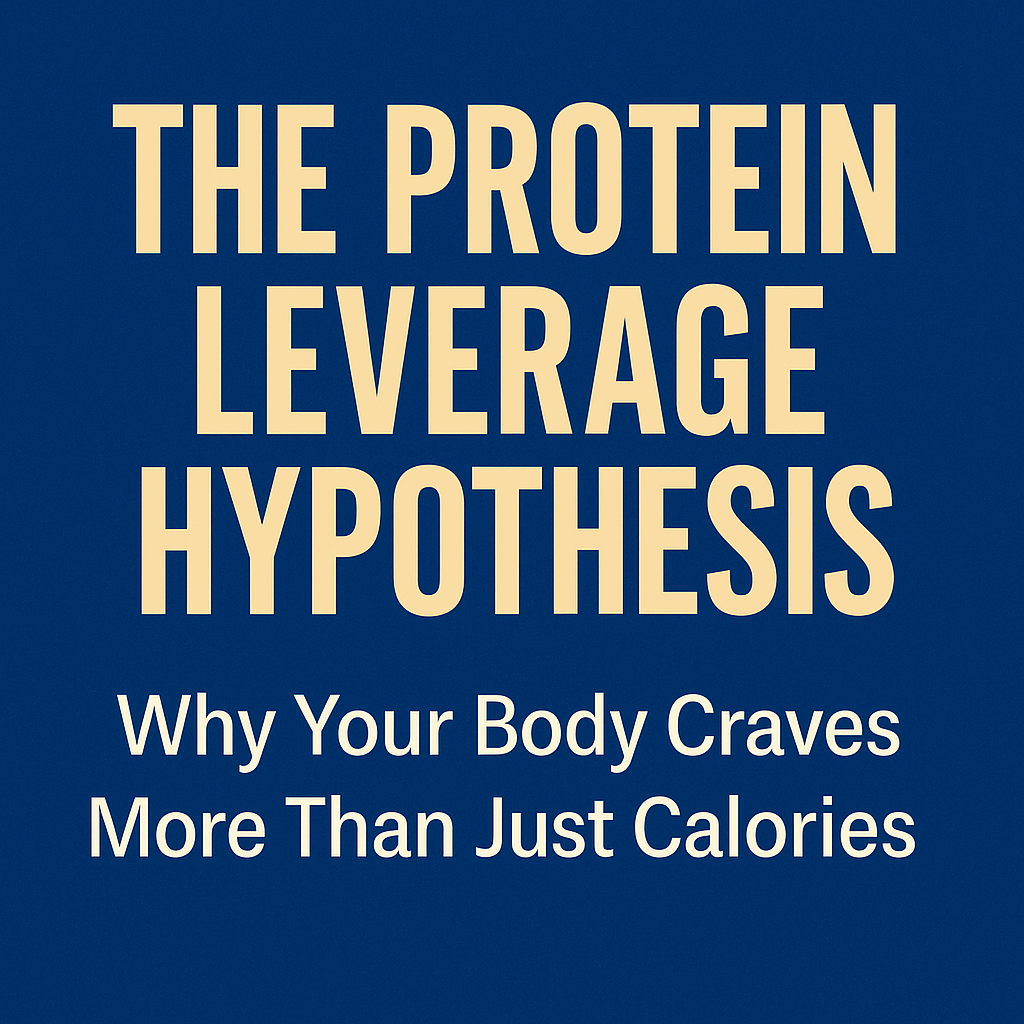
The Protein Leverage Hypothesis: Why Your Body Craves More Than Just Calories
Share
Why This Matters
We’ve all heard the advice: “Just eat less and move more.” Simple, right? Except it doesn’t explain why obesity rates keep climbing, or why some foods make us feel satisfied while others leave us hungry again an hour later.
Enter the Protein Leverage Hypothesis (PLH). A theory that could explain not just overeating, but why modern diets make it so easy to gain fat.
Think of this as the missing link between nutrition science and common sense. Your mom can follow it. A nutrition PhD can still argue over the details. And you’ll walk away knowing exactly why protein is the most important macronutrient in your diet.
What Is the Protein Leverage Hypothesis?
The Protein Leverage Hypothesis was first proposed in 2005 by nutrition researchers David Raubenheimer and Stephen Simpson. Here’s the short version:
-
Your body has a set protein target.
It will drive you to keep eating until that need is met.
-
If your diet is low in protein, you’ll overeat carbs and fats just to get enough protein.
That means more calories overall, even if you weren’t “hungry” for the extras.
-
If your diet is high in protein, you feel fuller sooner and naturally eat fewer calories.
In plain English: your body’s like a stubborn kid. It won’t leave the dinner table until it gets its protein.
Why Protein Has This Power
Protein isn’t just for muscles, it’s the raw material for nearly everything in your body: hormones, enzymes, neurotransmitters, immune cells. If you’re short on it, your body panics.
Here’s what makes protein special:
-
High satiety: Protein triggers satiety hormones like GLP-1, PYY, and CCK, which tell your brain you’re full.
-
Thermic effect: Protein costs more calories to digest than carbs or fat (20–30% of protein calories get burned during digestion).
-
Nutrient signaling: Low protein intake tells your body it’s in a poor nutritional environment, driving you to keep eating until the need is covered.
The Modern Diet Problem
In the wild, most foods humans ate had relatively high protein density (lean meats, fish, nuts, tubers).
In the modern food supply? Not so much.
Ultra-processed foods (chips, pastries, sugary drinks, fast food) are low in protein but high in fat and carbs. That’s the worst combo for satiety.
Example:
-
100 calories of chicken breast = 20g protein, super filling.
-
100 calories of chips = 1–2g protein, gone in a handful, leaves you wanting more.
The result? Protein dilution. Our food environment is full of calories but short on protein per bite, which leads us to unconsciously overeat.
Evidence for the Protein Leverage Hypothesis
-
Human studies: Controlled feeding studies show that when diets are diluted in protein, people eat more total calories without realizing it. When protein % is raised, calorie intake drops naturally.
-
Animal studies: Insects, birds, and mammals, including primates, show the same pattern: protein first, everything else second.
-
Population data: Many cultures eating traditional diets (higher in whole foods, moderate protein) have lower obesity rates compared to industrialized nations.
Practical Takeaways: How to Use This
-
Aim for ~1.6–2.2g of protein per kg of bodyweight (0.7–1.0g per lb).
-
If you’re 180 lbs, that’s 130–180g per day.
-
-
Front-load protein.
Eating protein early in the day helps control hunger later.
-
Prioritize complete protein sources:
-
Lean meats, fish, eggs, dairy, whey, soy.
-
-
Use protein as your anchor.
Build meals around protein first, then add carbs/fats for energy and enjoyment.
Why This Matters for Health and Longevity
This isn’t just about body fat. Higher protein intake is linked to:
-
More lean muscle mass
-
Better metabolic health
-
Reduced risk of frailty with aging
-
Improved recovery from exercise
In other words, protein protects your body now and later.
Conclusion
The Protein Leverage Hypothesis explains why so many modern diets set us up to fail: they starve us of protein while drowning us in calories.
If you make protein the cornerstone of your nutrition, everything else falls into place. You’ll feel fuller, eat less without trying, and support the muscle and health that actually matter.
References
-
Raubenheimer, D., & Simpson, S. J. (2005). The protein leverage hypothesis. Obesity Reviews.
-
Gosby, A. K., et al. (2011). Protein leverage and energy intake. Obesity.
-
Martinez-Steele, E., et al. (2017). Ultra-processed foods and added sugars in the US diet. BMJ Open.
-
Westerterp-Plantenga, M. S., et al. (2009). Dietary protein—its role in satiety, energetics, weight loss and health. British Journal of Nutrition.
